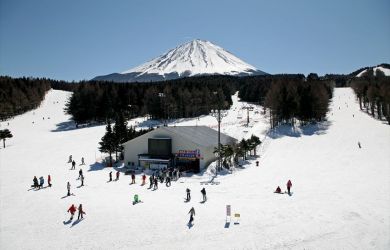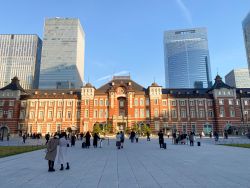
Originally published on metropolis.co.jp on June 2012
THE ANNALS OF SCIENCE

- Pass the Bloody Marys: Researchers at two of Japan’s top beverage companies say drinking tomato juice while getting drunk will allow you to sober up faster.
- In possibly related news, a research team that included scientists from the Kazusa DNA Research Institute in Chiba has, for the first time, fully decoded the genome of a tomato.
- The Meteorological Agency unveiled a supercomputer that can perform 847 trillion calculations per second—30 times faster than its previous machine. Even so, officials suspect it will be obsolete in about five years.
- A professor at Kansai Medical University has developed a treatment for bedsores that involves using the patient’s own blood platelets.
SKY-HIGH DIPLOMACY
- The foreign ministry announced that Japan might become just the fourth country—after India, Bangladesh and Kuwait—to open an embassy in the Himalayan kingdom of Bhutan.
- Meanwhile, the Japanese Embassy in Pakistan received a bomb threat from a caller with a Pashto accent who said, “You have committed injustice against our brothers.”
- Prime Minister Hashim Thaci became the first head of state from Kosovo to visit Japan. Thaci met with PM Noda and Foreign Minister Koichiro Gemba.
- The president of Armenia, Serzh Sargsyan, also stopped by Tokyo. It was the first visit by a head of state from the country since 2001, and it comes as Japan and Armenia celebrate 20 years of diplomatic ties. (And no, we have no idea how to pronounce his name, either.)
THE UNKINDEST CUT
- A doctor who paid ¥18 million for a black-market kidney transplant was sentenced to three years in prison. His wife got two and a half years for mediating the deal through the yakuza.
- A 30-year-old Japanese man who was attempting to ride a motorcycle from eastern Russia to western Africa was killed by robbers while camping outside Vladivostok.
- A Toyota affiliate in Turkey was accused of firing 143 workers because they are Muslim. The carmaker countered that the layoffs were due to “vehicle output reduction stemming from the 2011 earthquake and tsunami.”
- Sentence of the Week: “A semi-governmental corporation removed an explanation using an angry wife as a metaphor to explain radiation terms from one of its websites on June 4 after receiving complaints that it was inappropriate, it has been learned.” (via The Mainichi Daily News)
GRAY AND GRAYER
- The welfare ministry says the average life expectancy for Japanese women is 86.3 years, and for men it’s 79.55. That’s a rise of .78 and .99 years, respectively.
- The ministry also said it hopes to lower the rate of smoking among adults to 12 percent by 2022. The current rate is 19.5 percent.
- The LDP issued a new policy statement that calls for nationalizing the disputed Senkaku Islands and a constitutional amendment proclaiming the Emperor to be “Head of State.”
- Headline of the Week: “Soon-to-open Center to Turn Disaster-hit Dogs Into Therapy Dogs” (via Mainichi)
STRANGE DAYS
- Officials in coastal areas of Kochi are mulling over a tsunami-warning system that would seek to predict earthquakes based on signs of abnormal behavior in animals, including “chickens making noise and cats not returning home.”
- Passengers on Skymark Airlines flights were surprised to find a printed notice in their seat pockets informing them, among other things, that “cabin attendants are not required to use polite language toward customers.”
- Researchers at Nagoya University have discovered that the earth was bombarded by an unprecedented dose of cosmic rays in 775 CE. The cause of the flare-up remains a mystery.
- Officials from Japan and the UK have agreed to enter discussions on ways to “ensure safety in outer space.”
GOING FOR THE GOLD
- The mayor of (deep breath) Aizuwakamatsu, a radiation-stricken town near the Fukushima nuclear plant, advised residents to stay away for five years… not due to health concerns, but “to secure equal compensation payments.”
- Geisha girls and female staff of hot springs in Ishikawa have taken to calling themselves “Lady Kaga” in a bid to boost tourism to local onsen. Kaga is the name of a city in the prefecture.
- As part of efforts “to generate internationally successful young people,” the education ministry will let “particularly excellent high school students” graduate in just two years.
- A nine-year-old boy was one of six people whose designs were chosen for a series of commemorative coins related to the March 11 disaster.
AND FINALLY…
- In a bid “to relieve the animals of stress,” the environment ministry has prohibited pet stores from displaying dogs and cats after 8pm. An exception is being made for cat cafés, which can stay open until 10pm “if the animals are more than one year old and can move freely around the premises.”
- Sharp is planning to build a “mega solar power plant” in Nagano that can generate 9.2 megawatts of electricity—enough to power 3,000 households.
- The DPJ has come up with a plan to allow other cities besides Tokyo to establish special administrative wards… provided they have a population of at least 2 million.
- Bottom Story of the Week: “Financial Services Minister Matsushita Passionate About Rural Reform.” (via Kyodo)
Compiled from reports by AP, Japan Today, The Japan Times, The Asahi Shimbun, The Tokyo Reporter, Japan Probe, The Mainichi Daily News, Daily Yomiuri, AFP, Reuters and Kyodo







